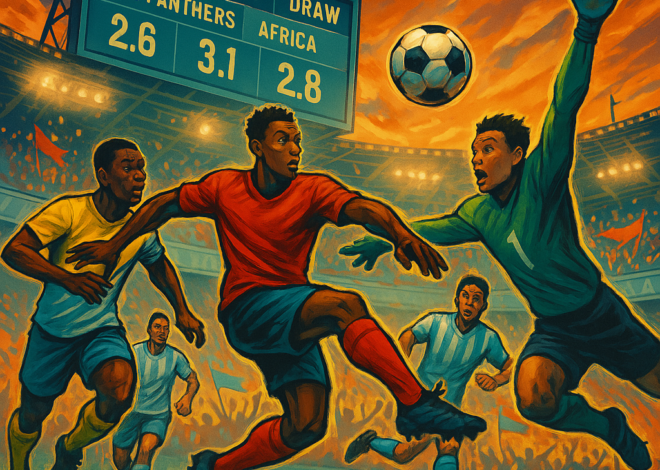
How Local Bookmakers Compete with International Giants in Africa
The African sports betting landscape has transformed dramatically over the past decade, evolving from a predominantly retail-based industry to a dynamic digital ecosystem worth billions of dollars annually. This evolution has created a fascinating competitive environment where local African bookmakers must contend with deep-pocketed international operators for market share. Despite facing significant resource disadvantages, numerous homegrown betting companies have successfully established and maintained strong positions across various African markets. Their success demonstrates the critical importance of local market understanding, cultural alignment, and operational adaptability in an industry where global standardization often fails to address unique regional needs and preferences.
Leveraging Local Market Knowledge
Local African bookmakers derive perhaps their most significant competitive advantage from deep understanding of specific market characteristics that international operators often struggle to fully comprehend. This knowledge encompasses cultural nuances, sporting preferences, betting behaviors, and infrastructural realities that vary dramatically between and within African countries. Successful local operators translate this understanding into precisely tailored product offerings and operational approaches that resonate with local bettors in ways generic international platforms frequently cannot match.
The granular understanding of local sporting interests represents a particularly valuable knowledge asset. While international operators typically focus on premium global sports content like European football leagues, local bookmakers often develop comprehensive offerings around regionally popular competitions that might receive minimal attention on global platforms. These include domestic football leagues, regional tournaments, and culturally significant sports like rugby in South Africa, basketball in Angola, or cricket in Zimbabwe. By providing extensive markets and competitive odds on these locally relevant competitions, homegrown operators create distinctive value propositions that attract specialized betting segments.
Payment Ecosystem Integration
Payment system integration represents one of the most crucial areas where local market knowledge creates competitive advantage. African payment ecosystems differ fundamentally from global norms, with mobile money systems and alternative payment methods dominating transactions rather than traditional banking instruments. Local operators typically develop deeper, more seamless integrations with these regional payment platforms, creating substantial user experience advantages compared to international companies applying standardized global payment approaches.
Regional Language Proficiency
Language localization extends far beyond simple translation for effective African market operations. Successful local bookmakers implement comprehensive language strategies that include support for regional dialects, culturally appropriate terminology, and communication styles that resonate authentically with local bettors. This linguistic connection creates significant user experience advantages over international platforms that might offer technically correct but culturally disconnected translations that feel foreign to local users.
Cultural Betting Preferences
Betting preferences vary significantly across African regions, with distinct patterns in preferred bet types, stake amounts, and risk appetites. Local operators demonstrate sophisticated understanding of these behavioral variations, creating tailored offerings that match regional expectations. For example, betters in certain West African markets show stronger preference for high-odds accumulator bets compared to East African bettors who often favor single-event wagers with moderate odds. Local bookmakers design their bonus structures, odds compilation, and user interfaces to align with these regional preferences, creating more intuitive experiences for local users.
Operational Adaptability to Infrastructure Realities
African betting operations face unique infrastructural challenges that require specialized operational approaches fundamentally different from those employed in more developed markets. Local bookmakers demonstrate remarkable adaptability to these conditions, creating technical solutions and business models specifically engineered for African realities. This adaptability creates significant competitive advantages over international operators whose platforms and processes are typically designed for environments with reliable electricity, consistent internet connectivity, and widespread banking access.
Connectivity optimization represents perhaps the most critical adaptation area, with successful local platforms engineered to function effectively despite bandwidth limitations and intermittent connectivity. These optimizations include lightweight applications requiring minimal data consumption, offline functionality for bet selection and slip creation, and progressive loading systems that prioritize essential betting functions before loading complementary features. Some innovative local operators have developed USSD-based betting interfaces that function on basic feature phones without internet connectivity, significantly expanding their addressable market beyond smartphone users.
- Local platforms typically require 50-70% less data to perform core betting functions compared to unoptimized international platforms
- USSD and SMS betting channels remain critical for reaching approximately 30-40% of potential customers in many markets
- Offline functionality shows 25-35% usage rates in markets with connectivity challenges
- Progressive loading approaches reduce abandonment rates by 40-50% in low-bandwidth environments
- Simplified interfaces optimized for entry-level smartphones show 30% higher conversion rates in certain demographics
- Battery optimization features become increasingly important in markets with unreliable electricity
- Session persistence technologies reduce transaction failures during connectivity interruptions by up to 60%
- Asynchronous betting confirmation systems prevent duplicate transaction issues during network fluctuations
The continuous electricity challenges across many African regions require specific operational adaptations that international platforms rarely implement effectively. Local operators develop sophisticated systems for transaction verification, session management, and data synchronization designed to maintain integrity during power fluctuations. These systems prevent common problems like duplicate transactions, lost bets, or account balance discrepancies that frequently affect platforms designed with assumptions of continuous power and connectivity.
Distribution Strategies and Physical Presence
Despite rapid digital transformation, physical presence remains critically important across African betting markets. Local operators leverage extensive agent networks, branded retail outlets, and community-based marketing to create omnipresent visibility that international online-focused operators struggle to match. This hybrid approach combines digital convenience with human touchpoints that address trust barriers, technical challenges, and educational needs that prevent certain customer segments from engaging fully with purely digital services.
Agent networks serve particularly important functions beyond simple transaction processing, acting as brand ambassadors, customer educators, and trust facilitators within local communities. These networks typically operate on commission structures that create entrepreneurial opportunities within neighborhoods while extending bookmaker reach into areas where digital adoption faces barriers. Successful local operators have developed sophisticated agent management systems that balance control requirements with entrepreneurial flexibility, creating sustainable distribution models that pure digital approaches cannot replicate.
- Physical touchpoints remain the initial betting access point for approximately 30-40% of new customers across major African markets, highlighting their continued relevance despite digital growth.
- Retail locations serve crucial educational functions, with staff providing digital onboarding assistance that transitions customers toward app usage over time, creating efficient customer acquisition funnels.
- Commission structures for agents and retail partners create economic incentives that drive grassroots marketing and customer acquisition without direct operator investment, providing cost advantages over traditional marketing approaches.
- Hybrid models allow flexibility in payment processing, with cash transactions accommodating unbanked customers while digital options serve the growing segment comfortable with electronic payments.
The strategic significance of physical networks extends beyond customer acquisition to brand visibility that creates atmospheric awareness even among digitally engaged bettors. Local operators establish thousands of branded touchpoints throughout urban and peri-urban environments, creating omnipresent visual reminders that develop familiarity advantages over digital-only international competitors. These physical networks simultaneously gather community-level intelligence that informs product development and marketing strategies with granular insights unavailable through digital analytics alone.
Personalized Customer Relationships and Engagement
Local African bookmakers cultivate deeply personalized customer relationships that create emotional connections beyond transactional interactions. This relationship-centered approach contrasts with the typically more automated engagement models employed by international operators optimized for scale rather than individual connection. The resulting loyalty advantages help local bookmakers retain customers despite potentially smaller promotion budgets or less extensive product offerings compared to international competitors.
Customer support represents a particularly important relationship component, with local operators typically offering more accessible, contextually relevant assistance compared to standardized international support models. Successful local bookmakers provide support through regionally preferred communication channels, with appropriate language options and resolution approaches tailored to cultural expectations. Support staff understanding of local betting practices, regional banking systems, and common technological challenges enables more effective problem resolution compared to generic support personnel without specific market knowledge.
Community Integration
Community engagement strategies create significant differentiation opportunities for local bookmakers, who typically demonstrate deeper understanding of social structures, influential networks, and cultural activities important to potential customers. Successful local operators develop specifically targeted sponsorships, events, and community initiatives that resonate authentically with regional priorities rather than applying standardized global marketing approaches. These engagement activities build genuine community connections that substantially increase customer acquisition efficiency while strengthening brand perception advantages over international operators perceived as disconnected from local concerns.
Relationship-Based Promotions
Promotion strategies employed by successful local operators frequently emphasize relationship development rather than purely transaction-driven incentives. While international operators typically focus on acquisition bonuses and standardized loyalty programs, local bookmakers often implement more socially oriented reward systems that reflect cultural preferences for community recognition and status affirmation. These approaches might include public acknowledgment of successful bettors, community-based competitions, or status tiers that confer social recognition beyond monetary value. Such culturally aligned approaches frequently generate stronger engagement despite lower absolute monetary value compared to international bonus schemes.
Customized Communication Approaches
Communication strategies represent another area where local operators demonstrate sophisticated cultural alignment that international competitors rarely match effectively. Successful local bookmakers develop messaging approaches, content styles, and engagement cadences that reflect specific cultural preferences regarding authority, humor, formality, and relationship development. These nuanced communication strategies create authentic connections that generic international messaging rarely achieves despite potentially higher production values or technological sophistication.
Regulatory Navigation and Compliance Adaptation
Regulatory environments across African betting markets vary dramatically in structure, enforcement approach, and stability, creating complex compliance challenges that require specialized local knowledge. Successful African bookmakers demonstrate sophisticated regulatory navigation capabilities that create significant operational advantages over international operators attempting to apply standardized compliance approaches across divergent jurisdictions. These capabilities include relationship development with regulatory stakeholders, nuanced understanding of enforcement priorities, and adaptive compliance systems designed for frequently changing requirements.
What distinguishes leading local operators is their ability to maintain compliant operations while adapting to regulatory reality rather than idealized standards. This pragmatic approach addresses the sometimes substantial gaps between written regulations and practical implementation that characterize many emerging regulatory frameworks. By understanding actual enforcement priorities and developing appropriate controls for genuine risks while avoiding unnecessary overhead for theoretical compliance concerns, local operators often achieve more efficient regulatory alignment than international companies applying rigid global standards that may exceed practical requirements.
Tax Optimization Approaches
Taxation represents a particularly challenging aspect of African betting operations, with frequently changing structures, occasionally punitive rates, and sometimes inconsistent implementation creating significant business model challenges. Local operators typically develop more effective approaches to tax compliance that balance legitimate optimization with sustainable contributions, avoiding both unnecessary burdens and dangerous avoidance strategies. This balanced approach contrasts with either excessive conservatism or aggressive avoidance sometimes observed among international operators less familiar with practical enforcement realities.
Stakeholder Relationship Development
Relationship development with regulatory stakeholders represents a critical capability for sustainable African betting operations that local companies typically execute more effectively than international competitors. Successful local operators invest significantly in constructive engagement with regulatory authorities, participating in policy discussions, providing industry perspective, and demonstrating commitment to market development beyond purely commercial interests. These relationship investments create valuable communication channels for navigating regulatory uncertainties while demonstrating good-faith commitment to appropriate oversight rather than extraction.
Licensing Structure Optimization
African betting markets feature diverse licensing structures with significant variations in cost, restrictions, and operational implications. Local operators demonstrate sophisticated understanding of these structures, developing optimal approaches that balance compliance legitimacy with operational flexibility and cost efficiency. This contrasts with international operators who sometimes pursue unnecessarily comprehensive licenses that exceed operational requirements or, conversely, attempt to operate under insufficient permissions that create future operational risks. A particularly valuable local capability involves understanding actual enforcement priorities regarding licensing technicalities that might be written into regulations but receive limited practical attention.
Technology Adaptation and Development Approaches
Technology development approaches represent another area where successful local bookmakers implement strategies specifically optimized for African market conditions rather than applying global standardization. These approaches typically emphasize pragmatic functionality, resource efficiency, and specific feature prioritization addressing local requirements rather than comprehensive platform development attempting to match international state-of-the-art capabilities. This focused development creates efficiency advantages while delivering more relevant user experiences despite potential disadvantages in overall technical sophistication.
Development methodologies employed by successful local operators typically emphasize rapid iteration and continuous deployment rather than extended development cycles. This approach allows frequent adaptation to market feedback, competitive changes, and infrastructure fluctuations that characterize dynamic African betting environments. The resulting platforms may appear less polished than international alternatives but typically deliver more relevant functionality aligned with actual user needs and operational realities rather than assumed requirements or global standards.
Mobile-First Optimization
Mobile optimization for African conditions involves substantially different approaches than international best practices developed for markets with different device profiles, connectivity characteristics, and usage patterns. Successful local platforms implement extreme data efficiency, battery conservation features, and cross-generation compatibility rarely found in international applications optimized for premium smartphone experiences. These optimizations create significant usability advantages for typical African bettors despite potentially less sophisticated visual presentation or feature completeness compared to international alternatives.
Third-Party Integration Approaches
Integration strategies with external systems including payment providers, data suppliers, and regulatory reporting mechanisms represent another area where local approaches frequently outperform international standardization. Successful local operators develop specialized integration capabilities with regional systems rather than relying on global standards that may function sub-optimally in African contexts. These specialized integrations create significant performance advantages in transaction processing speed, payment success rates, and data accuracy despite potentially less sophisticated overall architecture compared to international platforms.
Development Resource Efficiency
Resource constraints require local operators to implement highly efficient development approaches that maximize functional impact from limited investment. These approaches typically emphasize core betting functionality, essential user experience elements, and critical operational capabilities rather than comprehensive feature development across all platform aspects. The resulting products may offer fewer complementary features than international alternatives but typically deliver superior performance in fundamental betting functions most important to local users, creating more relevant experiences despite resource limitations.
Marketing Strategies and Brand Positioning
Local African bookmakers implement marketing strategies specifically calibrated for regional media consumption patterns, influence networks, and cultural resonance rather than applying standardized international approaches. These strategies typically demonstrate sophisticated understanding of local communication channels, message framing preferences, and aspirational associations that international campaigns often miss despite larger budgets. The resulting brand positions frequently achieve deeper emotional connection and cultural relevance than international alternatives perceived as generic or disconnected from local realities.
What distinguishes truly effective local marketing is not merely channel selection or language adaptation but fundamental message calibration addressing specific cultural values, social dynamics, and aspiration frameworks that vary significantly across African communities. Successful local operators develop brand associations with community pride, social connection, and cultural authenticity rather than merely highlighting product features or promotional offers. These emotional positioning strategies build loyalty advantages that transactional marketing approaches struggle to overcome regardless of budget size.
The most successful local marketing approaches recognize gambling’s complex social position within African communities, developing responsible positioning that acknowledges both entertainment value and potential concerns. This balanced approach creates sustainable social acceptance advantages over international operators sometimes perceived as extractive or insensitive to community impacts. By demonstrating authentic commitment to responsible operation through both messaging and actual practices, local operators build trust advantages particularly important in jurisdictions where gambling faces mixed social reception.
While international operators typically emphasize technological sophistication and global reach in their positioning, successful local operators leverage their community connection, cultural alignment, and local economic contribution as primary brand pillars. This positioning transforms potential resource disadvantages into authentic differentiation, presenting local identity as a positive value rather than limitation. The emotional resonance of these locally-centered brand positions frequently achieves stronger customer loyalty than feature-focused international positioning despite potential product limitations.
Future Competitive Dynamics and Evolution
The competitive dynamic between local and international betting operators continues evolving across African markets, with both consolidation and specialization trends simultaneously reshaping the landscape. While resource advantages favor international expansion, local knowledge remains a critical competitive factor that cannot be simply acquired without genuine market immersion. This tension creates interesting partnership and acquisition patterns, with various hybrid models emerging that combine international resources with local operational capabilities.
Market data suggests a potential equilibrium developing across several major African markets, where dominant local operators maintain substantial market share through superior operational execution despite growing international competition. This pattern contradicts early predictions of inevitable international dominance based solely on capital advantages, demonstrating the enduring value of local market expertise in an industry where contextual understanding significantly impacts operational effectiveness. The most successful international entrants have typically adopted substantial localization rather than merely extending global platforms, effectively acknowledging the competitive necessity of local adaptation despite its operational complexity.
The future competitive landscape will likely feature increased sophistication among leading local operators who continue developing technological capabilities while maintaining their local knowledge advantages. This evolution suggests potential for truly African multinational operators emerging from current local champions, potentially creating sophisticated competitors capable of challenging international giants across multiple markets through combined scale and local expertise. These emerging regional leaders represent perhaps the most interesting development in the evolving competitive landscape, potentially redefining assumptions about necessary resources for multinational betting operations.
The ongoing evolution of African betting markets demonstrates the limitations of purely resource-based competitive analysis in industries where contextual understanding and operational adaptation significantly impact effectiveness. Local African bookmakers continue proving that intimate market knowledge, cultural alignment, and operational flexibility create sustainable competitive advantages that balance resource limitations when competing against international giants. This dynamic creates a fascinating industry laboratory demonstrating the enduring importance of local relevance even in increasingly digital, globalized markets.



